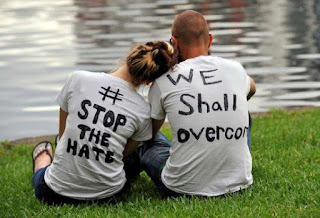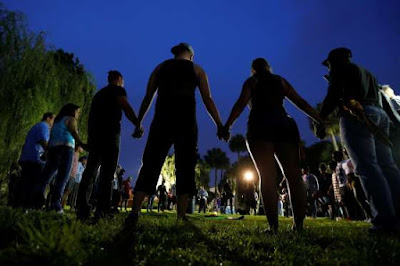“She stood behind him at his feet, weeping, and began to bathe his
feet with her tears and to dry them with her hair. Then she continued kissing
his feet and anointing them with the ointment. Now when the Pharisee who had
invited him saw it, he said to himself, "If this man were a prophet, he
would have known who and what kind of woman this is who is touching him-- that
she is a sinner."….. [Jesus said] You gave me no kiss, but from the time I
came in she has not stopped kissing my feet. You did not anoint my head with
oil, but she has anointed my feet with ointment. Therefore, I tell you, her
sins, which were many, have been forgiven; hence she has shown great love. But
the one to whom little is forgiven, loves little." Then he said to her,
"Your sins are forgiven." But those who were at the table with him
began to say among themselves, "Who is this who even forgives sins?"
And he said to the woman, "Your faith has saved you; go in peace." Luke 7:38-39,
45-50
This past Tuesday I came to the
parish to lead Morning Prayer as I usually do. My head was buzzing with the
details coming into focus from Sunday’s massacre at the Pulse nightclub not far
from my home. My heart was absolutely shattered as I breathlessly waited for
city officials to release the names of the 49 victims, feeling enormous relief
each time the name did not match that of any of my students or loved ones and
simultaneously feeling guilty for that relief. These were someone’s loved ones
if not my own, each bearing the image of G-d.
The discussion after our readings
turned almost immediately to the events of the weekend. Amidst the attempts to
make sense of two senseless, demonic events in one weekend here in our City
Beautiful, the gospel from last Sunday floated back into focus, a portion of
which is provided above.
Jesus is the consummate challenger of
conventional moral reasoning and the cultural values which inform it. He dines
with sinners - including the hated Roman tax collectors - and the ever so
self-righteous Pharisees alike. His parables, like the Good Samaritan, have
unlikely heroes – the despised people whose religion was seen as lacking in “orthodoxy,”
cultural lepers to good Jews. He engages the Syro-phoenician woman at the well, first dismissing her with a condescending but culturally appropriate
comment, then allowing his understandings to be drawn into question – by a
woman and a pagan no less - and ultimately repents of values he now recognizes
as misanthropic.
For Jesus, the ultimate value is
neither the tribal values of his culture nor the self-serving piety of his own religion.
Jesus sees a bigger picture. His teachings and actions constantly reinforce the
demand that his followers must discern the image of G-d on the face of the
other - no matter how well hidden behind cultural and religious constructions
they may be - and honor them.
The massacre at the Pulse nightclub
brings into focus a whole host of issues and the role our own cultural and
religious constructions have played in its occurrence. It is no accident that
the site targeted for this slaughter was a community bar which provided a safe
place for LBGTQ people, straight people and people of color to gather and
socialize. Bear in mind that this is hardly the only time a gay bar has been
attacked and its occupants injured and killed. Like the Holocaust coming at the
end of a long history Christian anti-semitism, it is simply the latest and,
with the rise of ever more efficient technologies of death, the deadliest.
This culminating bloodbath occurs
in a historical context of homophobia. And while the Christian tradition is not
alone in fomenting and developing that homophobia, it has been the most
powerful force in preserving that common social prejudice and legitimating its
expression today. Our own tradition has frequently spoken out of both sides of
its mouth, regularly affirming the “dignity of every human being” (Baptismal
Covenant) even as some of our dioceses bar gay married priests from its altars
and same-sex marriages from our parishes. Why is that?
It is also not incidental that the
patrons at Pulse that night were a rainbow of humanity that reflects the
diverse community metropolitan Orlando has become. Latinos represent about one
out of three Orange County residents today. They work and thrive in this welcoming
community but frequently come home to nightly doses of anti-immigrant sentiment
on their televisions which have come to dominate our current election. No doubt
few of them even recognize themselves in the caricatures that are constructed
of them in this process. Why is that?
It is also not surprising that the
immediate conclusion of so many of us was that somehow the Islamic faith was to
blame. Muslims are targets of suspicion and denigration in their daily lives
that none of us would ever tolerate. While no one would sum up the entire
Christian faith by radicals like the Westboro Baptist Church, which vows to
picket the funerals of the Pulse victims here, or murderous zealots who blow up
abortion clinics, we Christians have been quick to paint the 30% of our world’s
peoples who follow any path of Islam as radicals we must implicitly distrust. Why
is that?
Finally, it is hardly a shock that
the instrumentality of death early Sunday morning was a weapon of war legally
purchased in a country that simply cannot come to grips with its addiction to
guns. Automatic and repeatedly firing weapons are simply not the stuff of
defense of one’s home or hunting. All or nothing thinking is a common logical
fallacy which does not serve us here. But it is the mark of addictive thinking.
Like every addiction, our lives have become unmanageable. We have made very limited
attempts to curtail our indulgence of this deadly behavior with no success. It
just grows stronger. And we are in deep denial about it even as our children
are being slaughtered. Why is that?
All of these aspects of the Pulse shooting
raise serious issues about cultural values and religious understandings that no
longer serve us. They signal that the time for a very difficult discussion
about who we are as a people can no longer be avoided. But more importantly for
we who would follow Jesus, they raise the very same question that he raises
here: What prevents us from discerning the image of G-d in the face of the
other and showing it due reverence?
Recognizing and honoring the image
of G-d in the face of the other reflects the Great Commandments to love one’s
neighbor as oneself by which we demonstrate our love of the G-d who created us
all. When deeply held cultural values or religious beliefs come into conflict
with these Great Commandments, Jesus is very clear about which one must
prevail.
Are we?
Harry Scott Coverston is an Episcopal priest and Third Order
Franciscan. He is a former assistant Public Defender for the 9th
Judicial Circuit and just retired from the University of Central Florida where
he taught religious studies, interdisciplinary humanities and the philosophy of
law. He resumes his teaching as adjunct instructor at Valencia College this
fall teaching ethics and critical thinking.
+++++++++++++++++++++++++++++++++++++++++++++++++++++
Harry Scott Coverston
Orlando, Florida
frharry@cfl.rr.com
harry.coverston@knights.ucf.edu
If the unexamined life is not worth
living, surely an unexamined belief system, be it religious or political, is
not worth holding.
Most things worth considering do
not come in sound bites.
Do not be daunted by the enormity
of the world's grief. Do justly, now. Love mercy, now. Walk humbly now. You are
not obligated to complete the work, but neither are you free to abandon it. – Rabbi
Rami Shapiro, Wisdom of the Ages, Commentary on Micah 6:8











